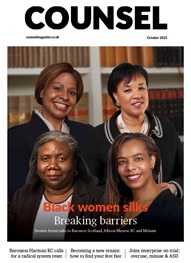*/
Barristers, including QCs, will be required to undergo a compulsory re-accreditation process every five years under proposals for a new criminal advocacy assurance scheme that is due to begin next July.
In its consultation paper, launched in August, the Joint Advocacy Group (“JAG”) said it was “important for the credibility of the scheme for QCs to be involved.
“The award of a mark of excellence by an independent body is separate from a regulatory quality assurance scheme which is assessing threshold standards”.
The scheme will apply to all criminal advocates, including legal executives, and is the joint initiative of the Bar Standards Board, Solicitors Regulation Authority and Ilex Professional Standards.
Advocates will be assigned one of four levels. Level one covers advocacy in the magistrates’ court, level two applies to the higher courts, level three covers complex advocacy in the Crown Court and level four covers the most complex Crown Court cases and appeals.
Assessment at the two highest levels will “need to be particularly robust” and will require judicial evaluation, JAG said.
The scheme includes a “traffic lights” system of warnings and concerns, under which judges can identify poor performing advocates and recommend them for further training.
Judges of Circuit judge level and above will be expected to take part. JAG acknowledges that judges have “historically” been “reluctant to identify” poor advocacy, and suggests a “programme of education and publicity coupled with senior judicial direction” can counter this.
While judges have been “largely non-interventionist”, JAG points out that they have reported “feeling increasingly constrained and frustrated at their inability to deal with advocacy standards”.
Advocates will be given three years from the start of the scheme to complete their re-accreditation process, and should “self-assess” in the meantime to decide on the level at which they currently practise.
Barristers have until 12 November 2010 to respond to the consultation.
In its consultation paper, launched in August, the Joint Advocacy Group (“JAG”) said it was “important for the credibility of the scheme for QCs to be involved.
“The award of a mark of excellence by an independent body is separate from a regulatory quality assurance scheme which is assessing threshold standards”.
The scheme will apply to all criminal advocates, including legal executives, and is the joint initiative of the Bar Standards Board, Solicitors Regulation Authority and Ilex Professional Standards.
Advocates will be assigned one of four levels. Level one covers advocacy in the magistrates’ court, level two applies to the higher courts, level three covers complex advocacy in the Crown Court and level four covers the most complex Crown Court cases and appeals.
Assessment at the two highest levels will “need to be particularly robust” and will require judicial evaluation, JAG said.
The scheme includes a “traffic lights” system of warnings and concerns, under which judges can identify poor performing advocates and recommend them for further training.
Judges of Circuit judge level and above will be expected to take part. JAG acknowledges that judges have “historically” been “reluctant to identify” poor advocacy, and suggests a “programme of education and publicity coupled with senior judicial direction” can counter this.
While judges have been “largely non-interventionist”, JAG points out that they have reported “feeling increasingly constrained and frustrated at their inability to deal with advocacy standards”.
Advocates will be given three years from the start of the scheme to complete their re-accreditation process, and should “self-assess” in the meantime to decide on the level at which they currently practise.
Barristers have until 12 November 2010 to respond to the consultation.
Barristers, including QCs, will be required to undergo a compulsory re-accreditation process every five years under proposals for a new criminal advocacy assurance scheme that is due to begin next July.


Justice system requires urgent attention and next steps on the Harman Review
Q&A with Tim Lynch of Jordan Lynch Private Finance
By Marie Law, Director of Toxicology at AlphaBiolabs
By Louise Crush of Westgate Wealth Management
Why Virtual Assistants Can Meet the Legal Profession’s Exacting Standards
Despite increased awareness, why are AI hallucinations continuing to infiltrate court cases at an alarming rate? Matthew Lee investigates
Many disabled barristers face entrenched obstacles to KC appointment – both procedural and systemic, writes Diego F Soto-Miranda
The proscribing of Palestine Action under the Terrorism Act is an assault on the English language and on civil liberties, argues Paul Harris SC, founder of the Bar Human Rights Committee
For over three decades, the Bar Mock Trial Competition has boosted the skills, knowledge and confidence of tens of thousands of state school students – as sixth-form teacher Conor Duffy and Young Citizens’ Akasa Pradhan report
Suzie Miller’s latest play puts the legal system centre stage once more. Will it galvanise change? asks Rehna Azim